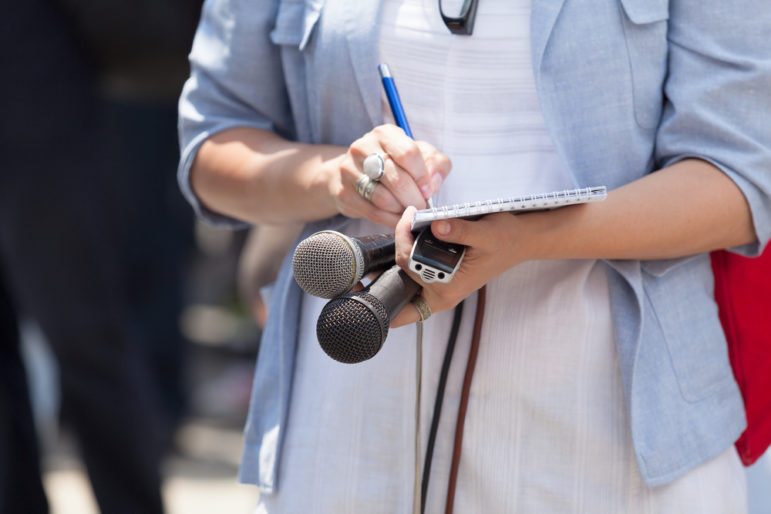

How Not to Win a Journalism Grant
Editor’s Note: With news organizations shrinking, investigative work increasingly is being done by freelancers and independent writers. That’s why we were delighted to come across this gem of an advice column by Eric Karstens, which he first posted back in 2016. If you’re looking for help with a one-off investigative or book project, you’ll find a wealth of tips here. You’ll also want to check out GIJN’s guide to Grants and Fellowships and, for bigger grants, typically by foundations to nonprofit newsrooms and media NGOs, be sure to look at GIJN’s guides to fundraising. And don’t miss GIJN’s own Bridget Gallagher on Effective Fundraising for Journalists our YouTube series, Top Tips with Experts.

Mapping Out the Money: These nine tips just might save your grant proposal. Photo: Rawpixel.com from Pexels
Grants for journalists are few and far between. Most are for relatively small amounts that often, however, make a world of difference. If you can afford the €1500 it takes actually to visit the place you are reporting on, your project might become viable in the first place, and readers will surely notice your first-hand experience. A precious few grant programs offer substantially higher amounts, such as Innovation in Development Reporting (Disclaimer: I am working for that project’s backoffice). Big grants can fund entire teams of journalists, photographers, experts, graphic designers, data specialists, coders and so on, while they tackle an ambitious investigation that today’s ailing news outlets might never have commissioned on their own.
I am personally involved in the grants business from different perspectives: As a grant writer myself, as a grant consultant, and occasionally as a member of a pre-jury. In these capacities, I have noticed nine common mistakes that are made by applicants, and especially by applicants from the journalism community. This is, in my observation, because journalists – in contrast to, for instance, NGOs – are not usually in the frame of mind for grants. They pitch their story to an editor, the editor says “no” or “yes” and they get to work. But drafting a grant application does not only require good advance planning, but also a somewhat complex technique. In a way, grant applications are pitches on steroids.
So here is my list of mistakes that tend to kill many fledgling journalistic projects before they even stand a chance. For the sake of clarity, I may be exaggerating a little, but really: only a little.
1) Not Reading and Understanding the Terms and Conditions
It is really astonishing how many grant proposals express only a rather fleeting knowledge of the framework conditions of the program they are applying for. Juries notice and discard such proposals immediately, even if they have merit in themselves. Because why should a program that calls for, say, coverage of the latest developments in bioscience fund a reportage about the refugee crisis?
Therefore, I recommend to read the call text not only twice, but as often as you can – you will be surprised by what kind of nuance you only discover once you have familiarized yourself with it very thoroughly. This is closely connected with…
2) Missing the Specific Topic
Even if proposals have got the general theme right, they often still manage narrowly to miss what the grants program is really about. If the call is, for instance, about development cooperation with the world’s least developed countries, then please do not come around with a proposal on rural development issues in East Germany. This may seem obvious, but I am actually speaking from experience here.
Accordingly, pay attention to the finer points of the call as well, and please do what you have learned as a journalist: perform some research so you really understand the funder’s fine print. But even if you do that, there is…
3) Not Being Specific Enough
Many proposals manage to hit the topic and conditions, but then fail because they do not develop a sufficiently concrete idea about what kind of specific story they would like to tell. A grant proposal about investigating corruption may be fine as such, but juries like to see that you have a particular case in your sights and will not merely run around researching until, by chance, you come across an interesting case.
Hence, do your homework before applying – perform some initial research, verify that your hunches are correct, explore whether you can really develop the sources you need to prove the story to your audience. And yet, even this is not enough, because you might be…
4) Not Explaining Yourself Properly
A lot of story ideas are brilliant, viable and a perfect match for the grants program they are applying to. However, a substantial amount of proposals do not manage to bring their brilliance across, which seems surprising for journalists – after all, precisely that is supposed to be their job. But it shows when the pitch was cobbled together quickly and half-heartedly, or does not bother to go into enough detail.
Assume that the jury does not know anything about the topic you are proposing, even as usually the opposite is true. The assumption of your audience’s ignorance will help you explain and motivate your pitch much more credibly. But then lurks the next pitfall…
5) Not Reassuring the Donor that You Can Actually Do It
There are many grant applications which master all the above mentioned steps, yet eventually fail to demonstrate the appropriate competences and skills to implement the project. Sometimes this is neglect, sometimes just naiveté. If you have never before been to Africa, the jury will certainly not let you travel to Congo – both because they are concerned about your welfare, and because they do not want to lose the grant money.
Competence can be proven in many ways. If you are an experienced reporter, hand in a detailed CV with verifiable references. If you lack the specific experience, show that you have researched the challenges well and developed reasonable tactics to meet them.
6) Suggest that You Are Grant-Eating
Some grant proposals flounder on credibility, even if the story idea is well developed. This happens in particular when there is no match between the person or team applying, and the topic. A seasoned sports reporter who all of a sudden aspires to investigate the intricacies of, for instance, nuclear arms proliferation, risks that the jury believes that she is in this only for the money that happens to be available, but not because of passion for the subject.
Usually it is most promising to apply for grants programs that have a clear relation to your career to date. But if you in fact have developed an entirely new interest, explain why and how that came about. Because otherwise, the jury might feel that you are just…
7) Assuming Entitlement
This actually happens especially to the best in the journalism business. They are perhaps already a kind of celebrity on their beat, or they work for a news organization that everybody knows and respects – or even worse, they work in television. They are used to doors always opening when they come calling, to politicians finding the time to talk to them no matter what. So why should some jury not give them a nice grant?
Of course it works in your favor if you have a good reputation and are widely known as a major opinion maker. And yet, juries tend to appreciate modesty. Carefully make the case for your proposal like everybody else, soberly and fetchingly. And avoid…
8) Submitting a Budget that Lacks Credibility and/or Reason
Budgeting is an art form, and journalistic projects are no exception. It is without doubt difficult to anticipate all costs and foresee all the financial issues that might crop up. Mistakes are forgivable. But there are budget proposals that are excessive, where the applicants award themselves salaries in the multiples of what they are usually making, or hope to keep some extra cash by over-pricing items.
Reason does it. Juries have a pretty good idea what journalists typically make, what a trip to an exotic location costs, and for how long you need to be there to report your story properly. Do not try and spend a week on the beach on the funder’s dime.
9) Puzzling over Donor Lingo and Templates
The final point is perhaps the least obvious one. Many grant makers have very specific ways of working and thinking. They might adhere to the logical framework approach, essentially unraveling projects from their end. Or they expect you correctly to fill in forms that are primarily meant to satisfy the requirements of the tax office or other regulatory authorities they answer to. This may be confusing and quite hard for first-timers.
The easiest way to overcome this is to ask previous grantees for their help – after all, they managed successfully. Find tutorials like this, look closely at the funder’s FAQs, or ask the funder’s experts – more often than not, they are happy to help.
Not to appear too negative, though. There are a great many really excellent journalism grants proposals out there – many more than any of the existing programs can ever hope to fund. However, I would insist that the job of the applicant is to make the the jury’s decision-making process as difficult as possible: Make them discuss your pitch seriously, have them weigh it scrupulously. But the above mistakes achieve exactly the opposite.
This post first appeared on Eric Karstens website and is reproduced here with permission.
 Eric Karstens is a consultant, developer, grant writer, lecturer, editor and author focusing on journalism, media development, the internet and media policy. He’s been involved with journalism grant-making and jury work – both from the donor and beneficiary angles — and with media programs in developing countries and Central and Eastern Europe.
Eric Karstens is a consultant, developer, grant writer, lecturer, editor and author focusing on journalism, media development, the internet and media policy. He’s been involved with journalism grant-making and jury work – both from the donor and beneficiary angles — and with media programs in developing countries and Central and Eastern Europe.
don’t miss GIJN’s own Bridget Gallagher on Effective Fundraising for Journalists our YouTube series, Top Tips with Experts.
Don’t miss GIJN’s own Bridget Gallagher on Effective Fundraising for Journalists.









